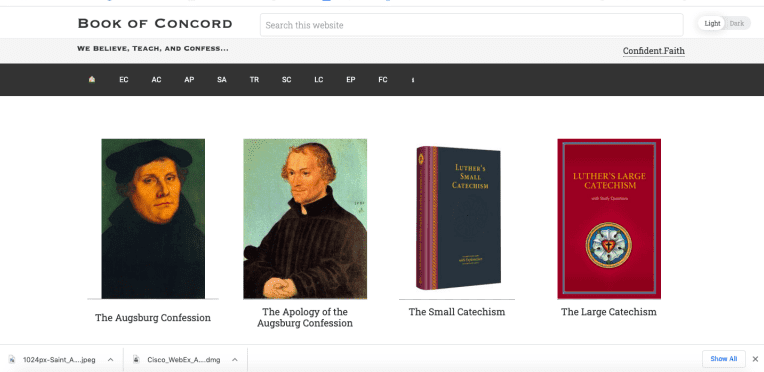The best, most important, and most helpful website for Lutherans, fans of the Reformation, and fellow-travellers is bookofconcord.org. And now that site has been redesigned, updated, and made even better!
Paul–himself a force of nature in the online world, who was sometimes a contentious figure in our comments here at the Cranach site–died earlier this year. But his contribution at bookofconcord.org is being carried on by attorney Corey J. Mahler, who has redesigned the site, giving it an attractive new look, making it more functional, and adding even more enhancements.
Not only is each confession cleanly accessible, but each section is presented along with a wealth of background material. For example, you can read each article of the Augsburg Confession, then click the Confutation, to see how the Pope’s theologians tried to refute it, and then click the Apology to see how Melanchthon refuted the Confutation!
The site also includes the original authoritative German version. It also includes a .pdf of the Latin translation, which had wide currency at the time and includes things like the mandate for parents to give their children a classical education (“to have them instructed and trained in a liberal education, that men may be able to have their aid in government and in whatever is necessary”].
On top of that, you can find other Reformation sources, such as the 95 Theses, the Heidelberg Disputation (in which Luther develops the Theology of the Cross vs. the Theology of Glory), the Catalog of Testimonies (in which Andrae and Chemnitz showed how Lutheran teaching about Christ is continuous with that of the early church), and much more.
The Book of Concord–called in Latin the Concordia, which is why so many Lutheran institutions have that name–are the official, definitive doctrinal statements of Lutheranism. The works of Luther, as a whole do not define what this theological tradition holds to; rather, this document does.
It consists of the three Ecumenical Creeds (the Apostle’s, the Nicene, the Athanasius); the Augsburg Confession (which defines the Reformation teachings while showing their continuity with the historic church) and its Apology (both by Melanchthon); the Smalcald Articles (on what would be non-negotiable in a church council, by Luther); the Treatise on the Power and Primacy of the Pope (a refutation of the papacy, by Melanchthon); Luther’s Small Catechism and Large Catechism (unsurpassed tools for teaching the Christian faith); and the Epitome and Solid Declaration of the Formula of Concord (a summary and an extended explanation, respectively, of how Lutheranism differs from heterodox Lutheranism and other kinds of Protestantism, mostly by Chemnitz).
Those of you who are not Lutherans may also find the Book of Concord interesting, not only in showing what it’s like to have a thoroughly worked out theology (something few other theological traditions have on this scale, written down), but in showing what the Reformation was originally about and in lots of important insights along the way.
For example, it is commonly said by more liberal scholars that the doctrine of the inerrancy of Scripture is a late invention by Scottish Calvinist rationalists. But here it is in Luther’s Large Catechism: “I and my neighbor and, in short, all men, may err and deceive, but the Word of God cannot err” (Part IV. Paragraph 57).
So thank you, Mr. Mahler (who also offers a wealth of Scriptural and devotional material at confident.faith), for providing this splendid resource!
Illustration: Screenshot of bookofconcord.org homepage













